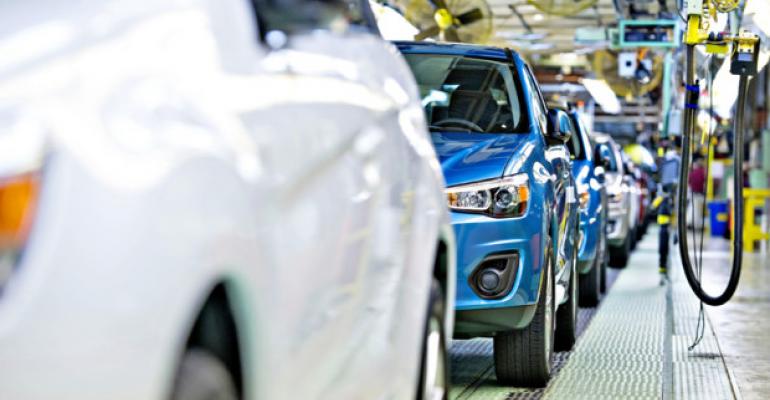Mitsubishi’s decision to close its plant in Normal, IL, is a major setback for the UAW union, which has struggled for years to persuade the Japanese automaker to keep building cars and utility vehicles in a facility where capacity far exceeded demand for the vehicles it built.
“The U.S. market didn’t take to the cars they produced there. They tried a number of products, but none really took off,” says Kristin Dziczek, an analyst at the Center for Automotive Research in Ann Arbor, MI.
The plant in Normal, which employs 1,250 hourly workers on one shift, is slated to close in November. The UAW has agreed to help Mitsubishi find a buyer for the facility, which opened in 1988 as part of the automaker’s Diamond-Star joint venture with Chrysler.
UAW Secretary-Treasurer Gary Casteel, who serves as director of the union’s Transnational Dept., pledges the support of the international union in advocating for continued jobs and production at the Normal plant.
“We will explore all possibilities, and leave no stone unturned, in assisting the leadership of UAW Region 4 and UAW Local 2488,” Casteel says.
The union has struggled for more than 30 years to organize workers employed at plants operated by Asian automakers in the U.S.
The Mitsubishi plant has been the only U.S. facility operated by a Japanese automaker where the UAW represents workers since the 2010 closing of the Fremont, CA, assembly plant operated by New United Motor Mfg., a Toyota-General Motors joint venture. Toyota shut the Fremont plant after GM abandoned the JV as part of its 2009 bankruptcy filing.
The Fremont plant now belongs to electric-vehicle manufacturer Tesla, whose employees do not have union representation.
The UAW has tried but so far failed to organize workers at Nissan, Toyota and Honda plants in Ohio and in the Southeastern U.S.
Rising Sales Buoyed UAW Hopes for Plant’s Survival
UAW President Dennis Williams, who had helped bring workers at the Normal plant into the union when the Diamond-Star JV was formed and negotiated their most recent contract as director of UAW Region 4, said last month the union was to meet with Mitsubishi to negotiate an agreement he hoped would land a new product for the Illinois factory.
With meetings set for earlier this month, the union’s optimism was lifted by an uptick in Mitsubishi sales over the past 18 months as the automaker seemed to break out of a decade-long slump. Strong demand boosted U.S. Mitsubishi deliveries 24.9% in first-half 2015 compared with year-ago, according to WardsAuto data.
But the union effort went for naught. Production of the ’16 Outlander Sport will be consolidated in Japan while Mitsubishi will continue to sell its cars, including current and planned models, at Mitsubishi dealerships across the U.S.
The Outlander Sport’s planned launch has been delayed to accommodate the change, according to Mitsubishi spokesman Alex Fedorak.
“We will produce it in Japan in January and it will go on sale (in the U.S.) shortly after,” he says in an e-mail. “This difficult decision follows years of challenge to remain viable, and was compelled by the combination of insufficient U.S. sales and low production capacity utilization.”
Concessions Outweighed by Undercapacity
Justin West, a past president and former bargaining chairman at UAW Local 2488, isn’t surprised by the shutdown.
“The writing has been on the wall for years,” West says in an e-mail. “Any of the last 10 years, the company could have easily justified a closure based on production or sales figures. They were struggling.”
Mitsubishi says the plant’s maximum capacity of 222,000 units was achieved in 2000. But production of Outlander Sport models last year reached only 69,000.
The low level of capacity utilization “wasn’t going to cut it,” West says, “and with a new labor agreement due in about a month (and) an aging workforce averaging in the mid-50s with seniority around 26-plus years, (Mitsubishi) probably saw a big cost bubble coming soon with little return.”
Says Hiroshi Harunari, Mitsubishi executive vice president in charge of overseas operations: “We greatly value the work of all of our employees in Normal and want to stress that our motivation to exit from this facility is unrelated to labor costs or our relationship with the UAW.”
Indeed, says West, concessions by the union ultimately didn’t help.
The UAW agreed to let Mitsubishi “set up a second-tier scale for all laid-off workers who returned, with an 8-year grow-in back to the first-tier wage but with no further accumulation of pension credits and with permanently reduced benefits,” he says.
The union also accepted a third tier for new hires with wages that never reached first-tier level and provided even fewer benefits than the second tier, he says.
“Our primary focus right now,” Hanunari says, “is to work together to identify a strategic buyer for the plant in order to transit into next phase.”
The UAW also hopes the plant will change hands rather than shut down.
The union will focus on helping Mitsubishi employees “transition to new job opportunities under new ownership,” says Ron McInroy, director of UAW Region 4.
“The Normal plant is a high-quality operation with very skilled and experienced employees. At a time when a growing number of car manufacturers are seeking to expand production capacity in the U.S., we believe the Normal plant and its world-class workforce will be appealing to potential buyers.”
Notes West, “I have a feeling (Mitsubishi has) been seeking out a partner for the plant, or to contract out production time on their lines at the plant, a la what Subaru does for Toyota, and there have been no takers.”
– with Christie Schweinsberg in Detroit




